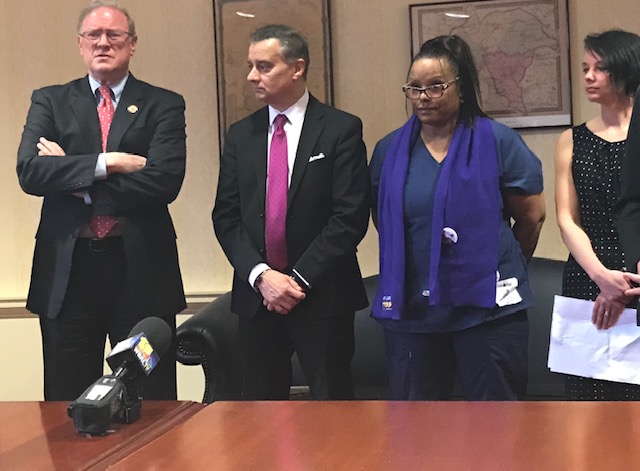@BryanRenbaum
[email protected]
Bipartisanship was on full display Tuesday as Maryland lawmakers and environmental advocates came together to support legislation that would phase out the burning of coal at the state’s six coal-fired power plants and provide money to take care of workers who would be affected by the transition.
The legislators and environmentalists spoke ahead of a Senate Finance Committee hearing on the legislation that began at 1 p.m. EST. The House Economic Matters Committee is scheduled to hold a hearing on the bill on March 5 at 1 p.m. EST.
“It really is a bold step forward to say the worst of the dirty energy is something we’re targeting for termination and that we’re gonna do it in a way that doesn’t harm workers. So, that’s our overall goal,” House Environment and Transportation Committee Chair Kumar Barve, D-Montgomery, said at a news conference at the Miller Senate Office Building in Annapolis. “Our goal is to shut down coal in a fixed timeline and to take care of all the workers because we don’t want to forget the people who worked in these coal-fired power plants.”
Barve said that the legislation calls for a five-year transition period but that the time frame will be negotiable. “We want do something that’s not too far in the future but also doesn’t provide market disruptions.”
Sen. Chris West, R-Baltimore County, described the legislation as the “right bill at the right time.” He said Maryland has “an unsustainable model for how we generate electricity using coal.”
None of the state’s coal-fired power plants has thus far operated for a single day this year, West said. Last year the plants operated for 17 days, he said, adding that the plants are dying a slow death.
“Any kind of a model that involves these very dirty plants trying to operate continually and make any kind of a profit at 17 days a year just doesn’t work. It’s not sustainable. These plants are going to close. Whether they close tomorrow or three years from now –they’re going to close.
“This bill provides lots of benefits for the displaced workers. We need to enact this bill so that when they close, the workers are provided for,” West said.
An agreement was reached with Warrior Run Generating Station to allow it to stay open until 2030 so that the the owners can comply with a federal contract they entered into, West said. Warrior Run is located in Allegany County near Cumberland and is the state’s smallest coal-fire power plant. Due to the agreement, West said, the owners of the plant –Arlington, Va.-based AES Corp. – will not oppose the legislation. But West said he does expect the owners of the other plants to fight the legislation. The other plants are located in Anne Arundel, Charles, Montgomery and Prince George’s counties.
Josh Tulkin, who is director of the Maryland chapter of the Sierra Club, said that when coal is burned the plants emit dangerous chemicals such as “sulfur dioxide, nitrogen, carbon dioxide, mercury [and] arsenic.” He said the chemicals not only pose a public health concern but also exacerbate the effects of climate change.
“They produce only less than 15 percent of our electricity but 85 percent of the carbon pollution coming from the electricity sector. We know that it’s time to move beyond coal but we also know that we need to do a better job of planning what the transitions will look like – for our communities and for our workers.”
The legislation, HB1545 and SB0887, would, according to its text, prohibit the “carbon dioxide emissions rate for certain affected electric generating units from exceeding a certain amount.” It would create the “Fossil Fuel Community Transition Account,” which would provide “grants to certain individuals and communities.” It would require the Department of Commerce “to establish certain policies and procedures for the administration of the Account.” It would require “the Maryland Energy Administration to use the Maryland Strategic Energy Investment Fund to provide funding for the Account.”




Carbon dioxide is NOT a pollutant. CO, sulphur and the others, yes. But unless these plants have not been retrofitted, coal technology has progressed to the point where it burns almost as cleanly as natural gas. The real question is what do they plan to transition to? Offshore wind? One of the most expensive, inefficient, dangerous and polluting energy sources yet. However, a lot of politicians like it because they can get rich supporting it. This is likely the true agenda.
How much money would be provided to the affected workers in these plants and for how long ?